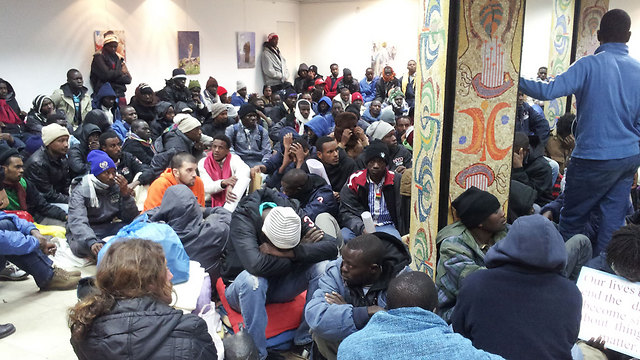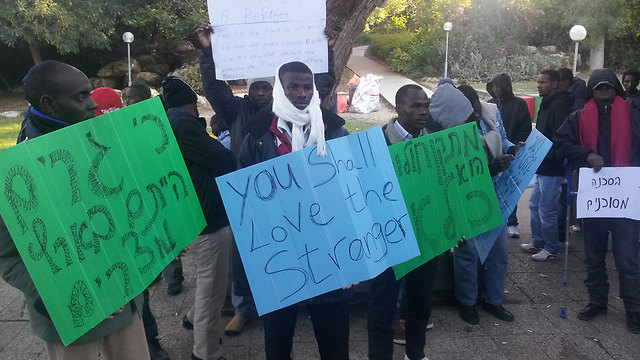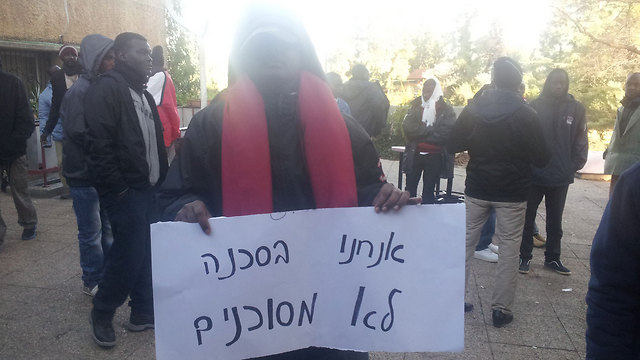Dozens of African asylum seekers who left the Holot open detention facility in southern Israel two days ago, arrived in Jerusalem on Tuesday morning for a protest outside the Prime Minister's Office.
The protestors arrived on buses from Kibbutz Nachshon, where they spent the night. They held signs reading, "We're in danger, not dangerous," and were received with a round of applause from some 100 additional protestors who arrived to support them.
Related stories:
- Following opening: Infiltrators flee from Holot facility
- New migrants' detention facility gears for opening
-
Knesset approves Infiltration Prevention Bill
Earlier Tuesday, inspectors of the Population and Immigration Authority, accompanied by massive police and Border Guard forces, arrived at Kibbutz Nachshon, north of Beit Shemesh, in order to detain some 150 African asylum seekers who spent the night there.
The refuge seekers left the Holot facility two days ago to try to march to Jerusalem, where they plan to rally outside the government building in protest of the Israeli authorities' failure to look into their requests for political asylum.
According to a new amendment to the Anti-Infiltration Law approved by the Knesset last week, anyone put in the open detention facility can be detained within 48 hours since leaving it and be jailed in the closed Saharonim facility.
Attorney Tony Garcia from the Office of the United Nations High Commissioner for Refugees, who is escorting the migrants, told Ynet: "We are concerned about their situation. The refugee seekers are desperate and therefore decided to launch a protest march under harsh conditions."
He explained that according to the UN Refugee Convention, Israel must look into each asylum request individually, but that the State has been failing to do so as a policy in recent years.
"We have discussed it with senior Israeli officials, but they have yet to provide us with answers," he explained.
Sources in the enforcement authorities told Ynet that the asylum seekers would not be arrested in the first stage if they reach the planned protest on buses. But if they march to Jerusalem and cause disturbances, they will likely be arrested.
According to the Israel Prison Service (IPS), some 280 refuge seekers left the facility where they were placed last week among 483 detainees from Shaharonim. The Holot facility is open during the day and closed at night. Those placed in may leave it during the day as long as they report to the facility three times a day and return at night.
Additional detainees left the facility on Monday. Within the past three days, more than half of the detainees have left the place, which cost hundreds of millions of shekels to build.
Earlier Monday, Population and Immigration Authority inspectors detained some 20 asylum seekers in Tel Aviv. Some of them were transferred to the open facility for the first time.
Mohammad, an asylum seeker from Darfur, told Ynet: "We are marching for our freedom. The State of Israel is not giving us our rights. We demand they go over our asylum requests. We were jailed for months at Saharonim, without the ability to communicate with the outside world. Now we are asking to be heard."
The Population and Immigration Authority said in a statement, "Human rights organizations are operating against the letter of the law and sabotaging its implementation when they convince the 'infiltrators' not to return to the facility.
"Without a doubt, they didn't return to the facility not because of the conditions, but – according to them – because they simply want to work. The Population and Immigration Authority will operate according to the law towards infiltrators who do not return to the open detention facility."
The authorities had expected the migrants to abandon the facility, as the first group to enter the open detention facility had been previously imprisoned at Saharonim for over a year. Despite the immediate setback, immigration authorities will bring other groups of migrants to the facility.
Omri Efraim contributed to this report
- Follow Ynetnews on Facebook and Twitter
- Receive Ynetnews updates
directly to your desktop



















